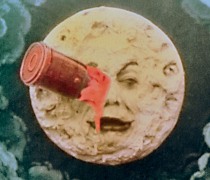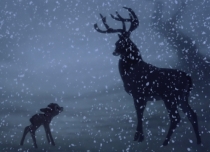I Can See Better Through the Fog is a storytelling podcast series in the vein of This American Life and the Moth. It tells the ongoing story of an echo boomer’s quarter life crises, featuring life, love, music, and San Francisco. Press the play button below to hear an audio recording of this latest entry or listen to it on iTunes. If it doesn’t work, you may need the latest version of flash software. (click here to download). Another troubleshooting tip would be to go directly to the soundcloud website. Sit back and let your ears do the work. The text version of this entry is provided beneath the list of selected tracks.
Runtime: 7 minutes and 23 seconds.
Selected tracks: Santigold “Big Mouth” and “This Isn’t Our Parade”
Weaving through a series of over the top floats and costumes, I searched for my friend Kelly. She’d invited me the previous night to march in the San Francisco Pride Parade with the organization she interned for. I passed shirtless boys in suspenders, policemen with rainbow beads around their necks, a San Francisco trolley full of same sex parents and their children, marching bands, cheerleaders, and a group with long balloons of all colors attached to their backs, making them look like coordinated peacocks.
Coming across an intricately designed float featuring a cartoonish ten foot model of the Golden Gate Bridge, I paused to listen to live music. At the back of the float, just below the bridge, was a blues band consisting of all black female musicians: the bassist had her head shaved, the lead guitarist wore long dreads, and the drummer covered her ‘do with a Rastafarian hat. They jammed to the beat of the marching band a few floats behind them, improvising to fuse the collegiate beat with their bluesy style. The bassist smiled down at me and mouthed the words “Happy pride”. “Thank you,” I mouthed back. “Happy pride to you too!”
I moved further down Spear Street, approaching Mission. Kelly was still nowhere to be seen amongst the gobs of people. My phone then buzzed from within my pocket. “Where are you?” I asked Kelly. “We’re in the yellow shirts, right next to the Golden Gate float,” she yelled over the cacophony of noise. I turned back to the direction from which I came, keeping the phone to my ear. “I see you,” Kelly yelled abruptly. I scanned the crowd until I caught her wave. She was positioned in the back of a group of thirty people wearing light yellow t-shirts with the name David Campos printed across them in patriotic colors.
“You look so cute!,” Kelly commented on the purple collared shirt, black tie, and acid washed slim jeans I wore. My fashion decision would soon be rendered useless. Kelly then handed me a David Campos t-shirt. “Uh,” I said hesitantly. “What am I supporting by putting on this t-shirt?” I trusted that if Kelly enthusiastically volunteered her time to a cause, it was a cause worth supporting. But I still wanted to have more information to go off of. “David Campos is running for reelection as Mission District rep.” She then listed a few of his legislative achievements, which included free municipal service for youth. Assured enough, I pulled the yellow shirt over my head, popped and refolded my purple collar, and draped my black tie over the V and M on the David Campos t-shirt. As long as I was going to walk for Campos, I decided I still would remain an individual. I wanted the true celebratory spirit of pride to remain in some regard.
One of Campos’s lead interns began hitting on one of Kelly’s girl friends that she had recruited. He wore black hipster sunglasses and smiled with an uninterrupted mischievousness during every word he spoke. First he asked what she did in the city, then what college she attended. He chimed in that his father had taught at her alma mater, and proceded to reminisce inauthentically. He was smooth and friendly, but his slick, polished social skills hinted at an ulterior motive. As a presumed student and practitioner of political strategy, he acted on behalf of his professional ambition, not to mention his penis, rather than any type of altruism.
The floats and paraders ahead of us began to inch forward. The parade was commencing. We marched down Market Street, clapping our hands to the beat provided by the blasting speakers on the float in front of us. Crowds of onlookers cheered and waved at us for blocks from behind barricades on both sides of the street. At some points the crowd was five people deep.
As I continued to walk and clap as enthusiastically as I could muster, a short, slightly pudgy hispanic man wearing purple tinted sunglasses and a soccer jersey approached me. “I’m David,” Campos introduced himself to me. “Thanks for coming.” He moved onto the next volunteer. I took no offense by his disinterest in carrying on more of a conversation than what he gave. We were in the middle of a fracus and it didn’t seem the most appropriate time to talk extensively. Yet it reinforced my view that politicians value winning more than their constituents’ lives.
We approached the block before the Civic Center where the parade would come to its end. Campos’s lead operative cupped his hands over his mouth and yelled back at us. “Let’s pick up the energy guys,” he pumped his fists in the air to “It’s Raining Men”. “There’s one last group of camera’s here at the end. Let’s make David look good!” He then began chanting “Campos” as a camera on a crane swooped down from the right. I scurried past it, not feeling the need to be seen through a lens.
On the last turn I noticed a beautifully robust girl in a painted tank top and a fashionably torn skirt leaning on a barricade. She carried a sign that read “Free Hugs”. I separated from Campos’s group and trotted over to her. We made eye contact, and hugged. We squeezed each other tight, with compassionate strength. “Happy pride,” she said. “Happy pride,” I reciprocated.










